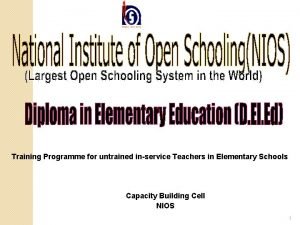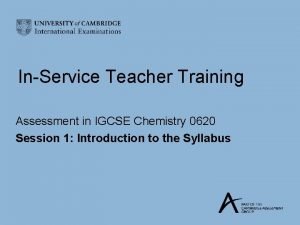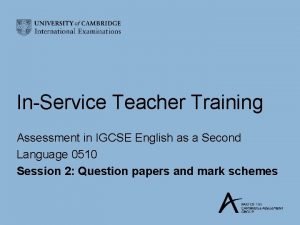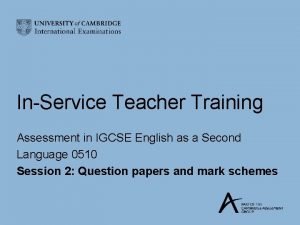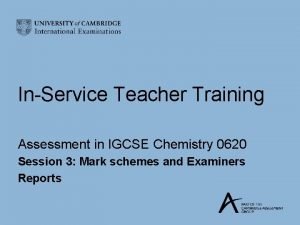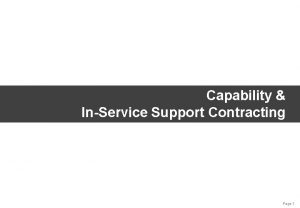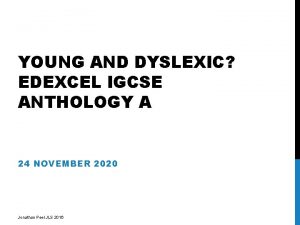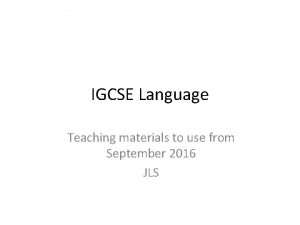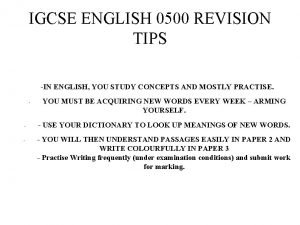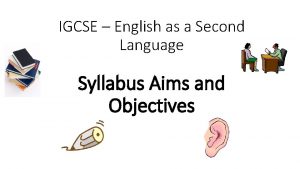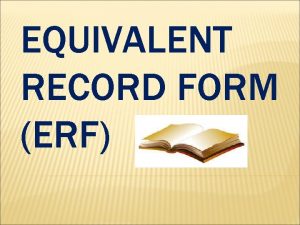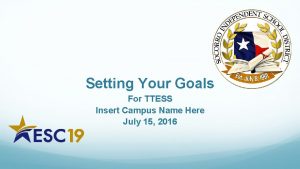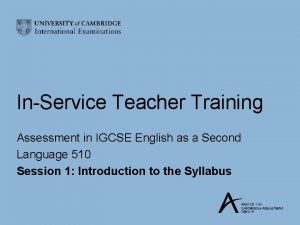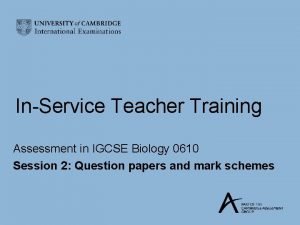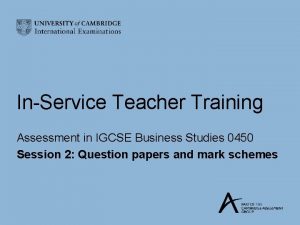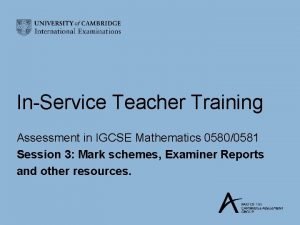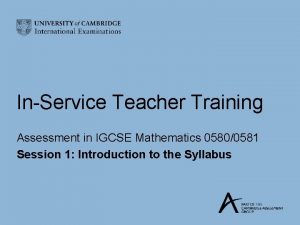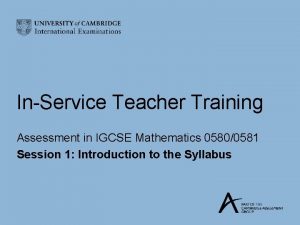InService Teacher Training Assessment in IGCSE English as















- Slides: 15

In-Service Teacher Training Assessment in IGCSE English as a Second Language 0510 Session 1: Introduction to the syllabus

www. cie. org. uk Welcome • Introductions • Background • Aim of training

www. cie. org. uk Session 1 looks at: Formative assessment • Syllabus aims • Structure of the syllabus • Assessment Objectives • Scheme of Assessment

www. cie. org. uk Aims of the syllabus • Use of English for the purpose of practical communication • Form a sound base for skills required for further study or employment (using English as the medium) • Develop an awareness of the nature of language-learning skills

www. cie. org. uk Assessment Objectives (1) • • Reading and Writing Speaking Listening Usage

www. cie. org. uk Assessment Objectives (2) • There are 20 Assessment Objectives across the four skills • For the receptive skills, reading + listening, the wording of the AOs is the same • For the productive skills, writing + speaking, AOs 1 to 3 use the same wording • Practice • Context

www. cie. org. uk IGCSE E 2 L Scheme of Assessment Reading, Writing, Listening

www. cie. org. uk IGCSE E 2 L Scheme of Assessment Speaking

www. cie. org. uk What is formative assessment? (1) Here are some views held by E 2 L teachers: • ‘Formative assessment is what leads to the constant improvement of the student. ’ • ‘Each type of formative assessment should be different; formative assessment should be varied to be effective. ’ • ‘Formative assessment is more important than summative assessment in E 2 L teaching and learning. ’ • Formative assessment means immediate feedback. ’

www. cie. org. uk What is formative assessment? (2) And some more views: • ‘Formative assessment leads to changes in teaching; it tells a teacher where next to go. ’ • ‘Only by using formative assessment can you find out about the different types of learners you have. ’ • ‘It’s assessment for learning, and not of learning. ’ • ‘Formative assessment should not be judgemental. ’ • ‘I use formative assessment more to evaluate my own teaching than my students’ learning. ’

www. cie. org. uk Formative assessment is. . . • …an interaction between student and teacher • …the means for the teacher to assess progress, for example, by feedback on tests • …the means of helping the student assess their own progress • …the means of encouraging improvement in performance

www. cie. org. uk Formative assessment: Ways of assessing progress • • • Marking Feedback on tests Answers given to verbal questions Target setting Student self-evaluation

www. cie. org. uk Formative assessment methods (1) • Record students occasionally in their natural learning environment. Invite them to listen to themselves and point out the mistakes they make • Keep a register of common vocabulary errors and/or deficiencies while teaching/listening to your students. Test these in a summative/formal way later • Use pencil to ‘mark’; suggest only areas to improve. Do NOT mark anything as ‘wrong’

www. cie. org. uk Formative assessment methods (2) • Ask students to mark each others’ work on a regular basis • Do more creative, sharing work. Ask your learners to explore more. It’s OK if they make more mistakes • Summarise learning by presenting in a different form - e. g. a summary becomes a poster outlining key points • Ask students to keep ‘learning’ journals. Read these on a regular basis

Closing comments
 Inservice training assignment
Inservice training assignment Igcse teacher training pack
Igcse teacher training pack Igcse teacher training
Igcse teacher training Igcse teacher training
Igcse teacher training Cie past papers chemistry
Cie past papers chemistry Inservice
Inservice Inservice examples
Inservice examples Young and dyslexic structure analysis
Young and dyslexic structure analysis Young and dyslexic annotations
Young and dyslexic annotations Igcse english revision
Igcse english revision Literature paper 1 edexcel
Literature paper 1 edexcel English language igcse paper 1
English language igcse paper 1 English as a second language igcse syllabus
English as a second language igcse syllabus Deped sample filled up erf form
Deped sample filled up erf form Good afternoon teachers
Good afternoon teachers Professional goals ttess
Professional goals ttess
